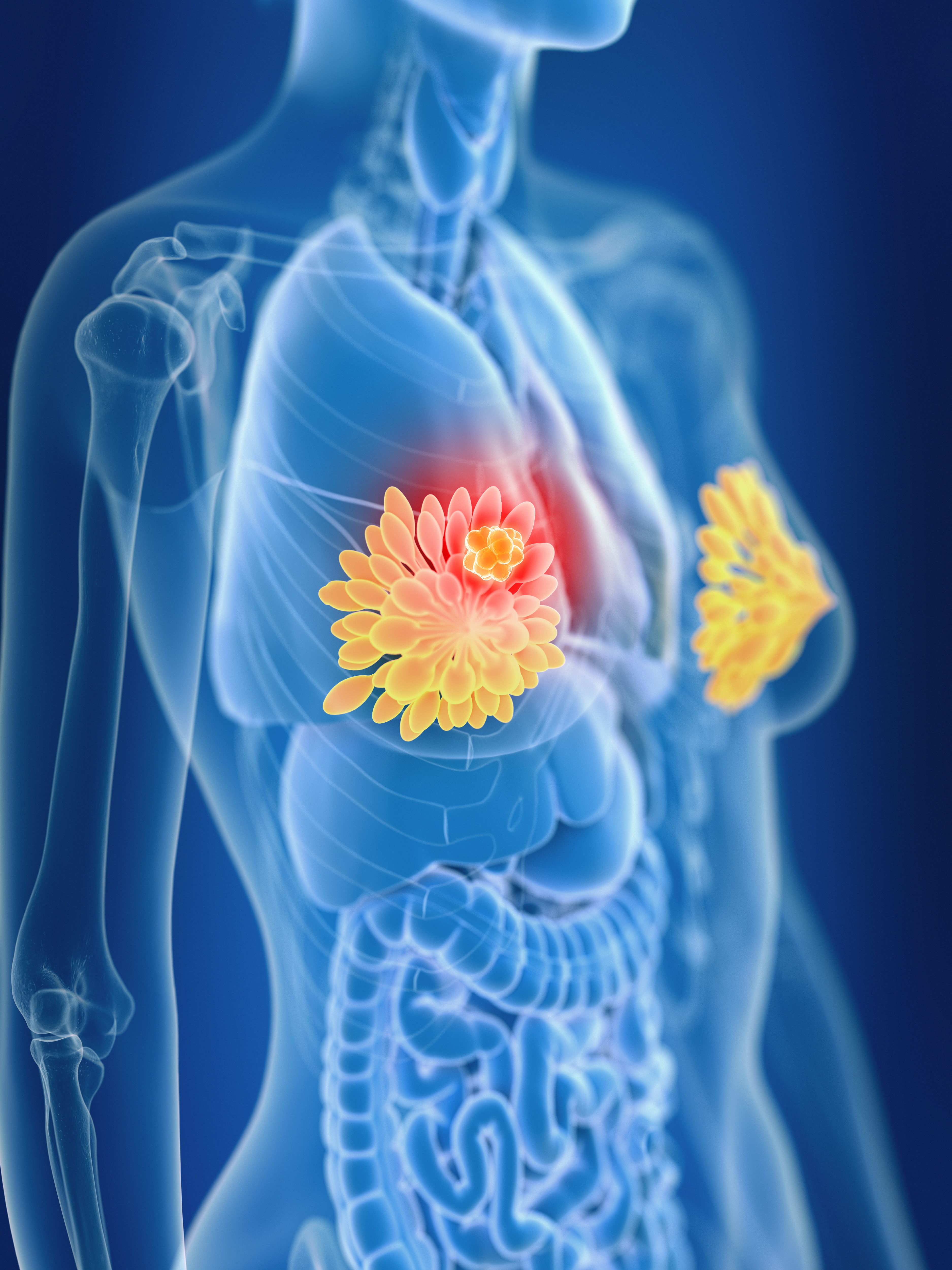Elinzanetant Shows VMS Reduction in Women With or at High Risk of HR+ Breast Cancer
Elinzanetant reduced vasomotor symptoms frequency and severity in women with or at high risk of HR-positive breast cancer in the OASIS 4 trial.
3D rendered medically accurate illustration of breast cancer: © SciePro - stock.adobe.com

The phase 3 OASIS 4 trial (NCT05587296) of elinzanetant for the treatment of women with or at high risk of developing hormone receptor (HR)-positive breast cancer has met its primary end points, leading to statistically significant reductions in the frequency of moderate-to-severe vasomotor symptoms (VMS) from baseline to weeks 4 and 12 vs placebo.1
All secondary end points of the study were also achieved, with elinzanetant demonstrating reductions in severity of VMS at weeks 4 and 12, VMS frequency reduction at week 1, and maintaining the effects over the study period.
Treatment with elinzanetant also improved sleep disturbances and menopause-related quality of life at week 12 compared with placebo. Over 52 weeks, the safety profile of elinzanetant was similar to that previously seen in studies of the agent, as well as in published data on elinzanetant in postmenopausal women with VMS.
“Elinzanetant has consistently demonstrated positive results across all four phase 3 clinical trials that assessed the efficacy and safety for the treatment of moderate to severe vasomotor symptoms associated with menopause or caused by adjuvant endocrine therapy,” said Christian Rommel, PhD, head of research and development and member of the executive committee of Bayer’s Pharmaceuticals Division, in a press release. “Importantly, OASIS 4 is the first pivotal international study to assess the safety and efficacy of a non-hormonal treatment approach for women with or at high risk of breast cancer who are suffering from VMS caused by adjuvant endocrine therapy, reaffirming our commitment at Bayer to advancing innovative treatments for the different needs of women and their health.”
Elinzanetantis a dual neurokinin-1 and -3 receptor antagonist, and the first of its kind, in late-stage clinical development for the non-hormonal treatment of patients with moderate-to-severe VMS linked to menopause or caused by adjuvant endocrine therapy for breast cancer. The agent is administered to patients orally once a day.
The phase 3 OASIS 4 study is the first pivotal international trial to examine the efficacy and safety of a non-hormonal treatment of moderate-to-severe VMS caused by adjuvant endocrine therapy. OASIS 4 marks the fourth phase 3 study in the OASIS clinical development program to demonstrate positive topline results.
Further data from the study are expected to be presented at an upcoming medical meeting.
“For women undergoing endocrine therapy against breast cancer, menopausal symptoms like VMS and sleep disturbances are very common and can significantly affect quality of life, potentially impacting treatment adherence,” said Fatima Cardoso, MD, principal investigator of OASIS 4, from Lisbon, Portugal, in the press release. “The positive results from OASIS 4 bring us one step closer to a much-needed non-hormonal option for managing VMS in breast cancer patients and women at risk of breast cancer.”
About the OASIS 4 Trial
As of February 21, 2024, a total of 473 female patients aged 18 to 70 years old have been enrolled in the double-blind, randomized, placebo-controlled, multicenter study.2
Enrollment was open to patients experiencing VMS as a result of adjuvant endocrine therapy that they are expected to use for the duration of the study, those with a personal history of HR-positive breast cancer or those at a high risk for developing breast cancer, and patients who have completed a hot flash daily diary for at least 11 days during the 2 weeks preceding baseline visit. Patients must also have recorded at least 35 moderate-to-severe hot flashes over the last 7 days that the hot flash daily diary was completed.
In the experimental arm, patients are receiving elinzanetant at a dose of 120 mg orally once daily. Patients in the comparator arm are being treated with matching placebo orally once daily.
The primary end points of the study are to assess the mean change in frequency of moderate-to-severe hot flash from baseline to week 4, and the mean change in frequency of moderate-to-severe hot flash from baseline to week 12. Secondary end points will also evaluate the mean change in severity of moderate to severe hot flash from baseline to weeks 4 and 12, the mean change in frequency of moderate to severe hot flash from baseline to week 1 and from baseline over time, the mean change in patient-reported outcomes measurement information system sleep disturbance short form 8b total score from baseline to week 1, and the mean change in menopause-specific quality of life scale total score from baseline to week 12.
REFERENCES
Elinzanetant meets all primary and secondary endpoints in phase III study OASIS 4 for treatment of moderate to severe vasomotor symptoms caused by breast cancer treatments. News release. Bayer. January 9, 2025. Accessed January 20, 2025. https://tinyurl.com/y46nam6s
A study to learn more about how well elinzanetant works and how safe it is compared to placebo for the treatment of hot flashes caused by anti-cancer therapy in women with, or at high risk for developing hormone-receptor positive breast cancer (OASIS-4). ClinicalTrials.gov. Updated December 27, 2024. Accessed January 20, 2025. https://clinicaltrials.gov/study/NCT05587296